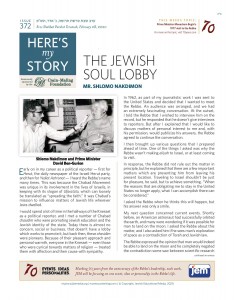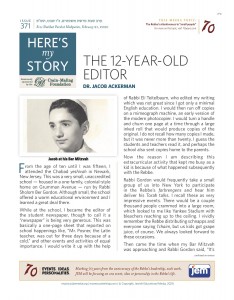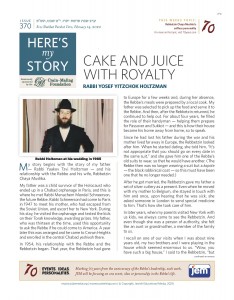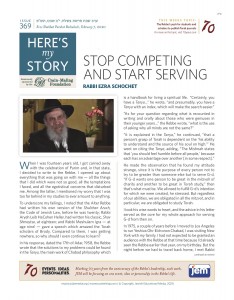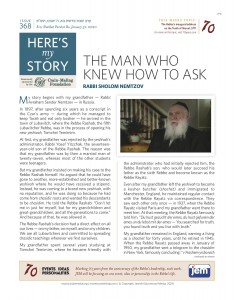The Jewish Soul Lobby
Early on in my career as a political reporter – first for Herut, the daily newspaper of the Israeli Herut party, and then for Yediot Achronot – I heard the Rebbe’s name many times. This was because the Chabad Movement was unique in its involvement in the lives of Israelis, in keeping with its slogan of Ufaratzta, which can loosely be translated as “spreading the faith.” It was Chabad’s mission to influence matters of Jewish life wherever Jews dwelled.
I would spend a lot of time in the hallways of the Knesset as a political reporter, and I met a number of Chabad chasidim who were promoting Jewish education and the Jewish identity of the state. Today there is almost no concern, social or business, that doesn’t have a lobby which works to promote it, but back then, these chasidim were pioneers. Because of their pleasant approach and personal warmth, everyone in the Knesset – even those who were cynical towards matters of religion – treated them with affection and their cause with sympathy.
In 1962, as part of my journalistic work I was sent to the United States and decided that I wanted to meet the Rebbe. An audience was arranged, and we had an extremely fascinating conversation. At the outset, I told the Rebbe that I wished to interview him on the record, but he responded that he doesn’t give interviews to reporters. But after I explained that I would like to discuss matters of personal interest to me and, with his permission, would publicize his answers, the Rebbe agreed to continue the conversation.
I then brought up various questions that I prepared ahead of time. One of the things I asked was why the Rebbe wasn’t making aliyah to Israel, or at least coming to visit.
In response, the Rebbe did not rule out the matter in principle, but he explained that there are a few important matters which are preventing him from leaving his present location. Traveling to Israel shouldn’t be just for pleasure, he said, but to achieve something. “When the reasons that are obligating me to stay in the United States no longer apply, what I can accomplish there can be considered.”
I asked the Rebbe when he thinks this will happen, but his answer was only a smile. (more…)


